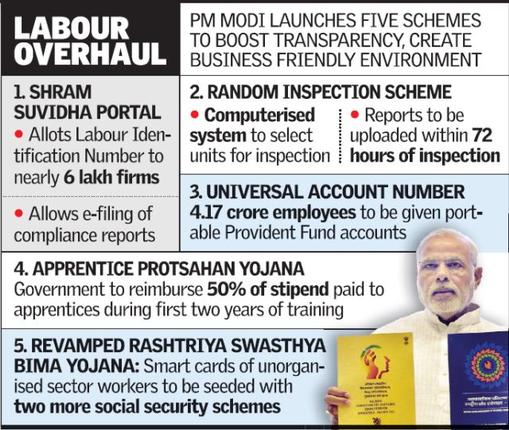IASbaba's Daily Current Affairs Analysis, IASbaba's Daily Current Affairs July 2015, International, National, UPSC
Archives
IASbaba’s Daily Current Affairs- 22th July, 2015
NATIONAL
Labour Reforms and Challenges involved
- Underlining the “historical role of tripartite mechanism” for enactment of labour laws, the Indian Labour Conference said that labour laws need to be relooked and updated in a time-bound manner.
- But said that the welfare and rights of workers, sustainability of enterprises and job creation and industrial peace must be taken into account

What is the Tripartite Mechanism?
The term ‘tripartism’ is used in the sense of a process (of cooperation) whereby governments
- consult and involve representatives of employers and workers in the formulation ofSocio-economic policies at the national and industry levels and in particular, on the Legal framework of labour relations and labour-related policy;
- ensure that the social partners’ views and concerns are reflected in the policies and laws
Formulated;
- provide the social partners with opportunities to contribute to socio-economic progress, and thereby enable them to fulfil a wider role than one of only providing direct services to their members in relation to matters covered by the employment relationship.
The tripartite arrangements – both formal and informal – that may be adopted (consultation fora or bodies) are the means which give effect to the basic objectives of tripartism.
What gives robust structure to Labour Relations?
- Both industry and trade union representatives should welcome the reported proposals to introduce a provision in the draft labour code making it mandatory for factories to recognise a trade union as the “principal bargaining agent” for settling a dispute or engaging in a discussion with employers.
- This provision, together with a formally specified threshold of 10 per cent of workers or 100 workers (whichever is less) for union registration, is likely to impart a more robust structure to labour relations, currently bedevilled by a multiplicity of trade unions and arbitrary managements.
- Other suggested reforms should also be taken forward.
What is the Core Economic Issues Involved?
- The core economic issues are varied: the capital intensity of Indian industry, the employment elasticity of economic growth, the exchange rate strategy, the level of skills on offer in the labour market, the ease of doing business, the structural impediments faced by informal enterprises and much more. Indian industry seems to believe that all that matters is waving a magic wand called labour market reforms.
- The problem is far more complicated.
IAS BABA’s View
- Making the Indian labour market less rigid is thus not just about the freedom of big business houses to fire people at will.
- Nor should it be restricted to such an outcome.
- The real reason to push ahead with labour market reforms is that these reforms should interact with changes in other areas of industrial regulation so that factory employment begins to rise in tandem with output.
Connecting the Dots:
- Can India absorb the large number of new entrants to its labour market with adequate reforms?
- Does the draft Labour Code on Industrial Relations Bill 2015 would correct serious legacy problems?
- Write a note on Indian workers in Unorganized sector
Fixing food regulation : Maggi Controversy
The country’s food regulator, the Food Safety and Standards Authority of India (FSSAI), has come in for severe criticism since it banned Nestle India’s Maggi noodles last month following claims that excessive amounts of monosodium glutamate (MSG) had been found in some samples.

What is the role of FSSAI?
The FSSAI has been established under Food Safety and Standards Act, 2006.
- This act consolidates various acts & orders that have hitherto handled food related issues in various Ministries and Departments.
- FSSAI has been created for laying down science based standards for articles of food and to regulate their manufacture, storage, distribution, sale and import to ensure availability of safe and wholesome food for human consumption.
What is the new hope from FSSAI to resolve these issues?
- The FSSAI has reportedly finalised about 12,000 standards for food ingredients and additives which, it is claimed, are in line with the global safety and quality standards.
- If so, once enforced, food companies may not need to seek product approvals if they follow these standards.
- The option of random sampling for quality assessment of the packaged products would always be available to the FSSAI to ascertain compliance.
- Hopefully the principles of minimum interference and global benchmarking will be considered paramount.
IAS BABA’s View
- Regardless of the merits and demerits of the specific case, the fact remains that some of the adverse fallout of the regulator’s actions cannot be overlooked.
- Some 700 new food products are said to have been awaiting pre-launch approval from the FSSAI for over a year because of the cumbersome and lengthy approval procedures.
- In addition, consignments of imported food products often remain stuck at the ports for long for want of clearance by the FSSAI.
- In many cases, permission is withheld on the flimsiest of grounds – because the labelling of the packages does not conform to arbitrary norms specified by the FSSAI, which differ from the widely accepted global standards.
Connecting the Dots:
- Is the problem rooted in the Food Safety and Standards Act, 2006, which neither defines “product approval” nor lays down any norms for this purpose?
- Write a note on Monosodium glutamate(MSG)
- Explain how the transparent regulation and global standards can be Implemented in India?
INTERNATIONAL
Strategic importance of Ufa summits
- The recently concluded twin summits in Ufa, Russia – of the BRICS (Brazil, Russia, India, China and South Africa) grouping and the SCO (Shanghai Cooperation Organization) are a strategic milestone for the emerging global order and India’s role in it for several reasons.
- Russia sought to use the summit to defend and strengthen its own global standing over the Ukraine imbroglio and highlight that it was not isolated either politically or economically, despite the sanctions imposed by the Group of 7 countries (G7).
- This has a stark resemblance to the twin BRICS (South Africa became a member in 2010) and SCO summits that Russia hosted in Yekaterinburg in 2009, a year after Russia faced international criticism for its invasion of neighbouring Georgia.
Issues and Challenges in the recently held summit:
- Russia : Both 2009 & 2015 Summit, has not improved Russia’s international standing. In fact, the efforts put has only reflected Russia’s diminishing role in shaping the emerging world order, which is increasingly being determined by other BRICS and SCO members, especially China.
- There are some inherent contradictions between the various BRICS and SCO members, particularly China and India. For instance, regarding the issue of terrorism – the Ufa declaration states that, ‘UN has a central role in coordinating international action against terrorism, which would effectively be addressed through the UN Global Counter-Terrorism Strategy. But it does not say anything about China’s blocking of India’s move in the United Nations to challenge Pakistan’s release of Zaki-ur Rehman Lakhvi, the alleged mastermind behind the 26/11 Mumbai attacks.
- Also there are contradictions among BRICS members on how the Internet should be governed.
- There are issues raised over India’s decision to join the SCO ( which has been referred to as the ‘league of dictators’) as it may contradict the principles of Democracy. However, this holds any weight since India can use SCO as an opportunity to enhance its connectivity and boost trade by easing barriers, particularly with the Central Asian members. And also to resolve its disputed border with China.
- Though the Ufa declaration stresses on the BRICS’ role in maintaining international peace and security, advance global development and promote and protect human rights, there has been no steps taken to reform UN Security Council.
Way forward:
- While the formal establishment of the New Development Bank (NDB) has made BRICS a serious international actor in the financial forum, inability to reach similar consensus on UN reform, governance of the Internet and counter-terrorism will limit its political clout. So these issues must be taken as a priority and a consensus should be reached at the earliest.
- India, which assumes the leadership of the grouping and will host the next summit, should make sure that a consensus is built to transform the BRICS into a significant strategic global actor.
Background:
Shanghai Cooperation Organisation (SCO):
- The SCO is a Eurasian political, economic and military organisation which was founded in 2001 in Shanghai.
- Members: China, Kazakhstan, Kyrgyzstan, Russia, Tajikistan, Uzbekistan. In July 2015, the SCO had decided to admit India and Pakistan as full members, and they are expected to join by 2016.
BRICS:
- BRICS is the acronym for an association of five major emerging national economies: Brazil, Russia, India, China and South Africa.
- The grouping was originally known as “BRIC” before the inclusion of South Africa in 2010.
- The BRICS members are all developing or newly industrialised countries, but they are distinguished by their large, fast-growing economies and significant influence on regional and global affairs.
- Since 2010, the BRICS nations have met annually at formal summits. Russia currently holds the chair of the BRICS group, and had hosted the group’s seventh summit in July 2015.
The Group of 7 (G7):
- The Group of 7 (G7) is a group consisting of the finance ministers and central bank governors of seven major advanced economies as reported by the International Monetary Fund: Canada, France, Germany, Italy, Japan, the United Kingdom, and the United States meeting to discuss primarily economic issues. The European Union is also represented within the G7.
- Objective: The organization was originally founded to facilitate shared macroeconomic initiatives by its members in response to the collapse of the exchange rate 1971, during the time of the Nixon Shock, the 1970s energy crisis and the ensuing recession.Its goal was fine tuning of short term economic policies among participant countries to monitor developments in the world economy and assess economic policies.
- The next major G7 summit will be held in 2016 in Japan.
Courtesy – Wikipedia
Connecting the Dots:
- Critically examine the geostrategic and geopolitical implications of India’s membership to SCO.
- Is there still a role for the concept of balance of power in contemporary international politics?
- What is the role of India in the emerging global order? Can India become a World leader?











